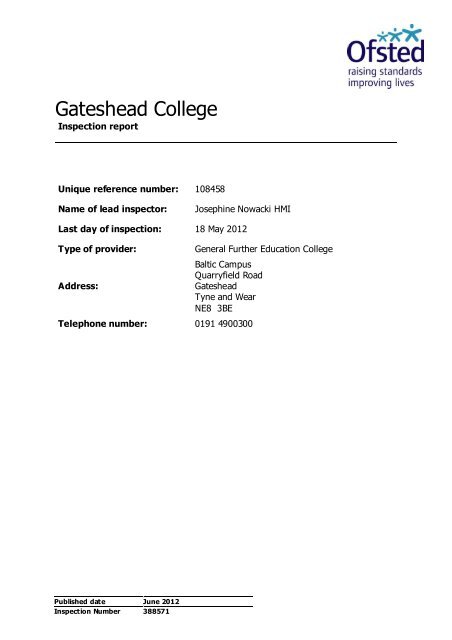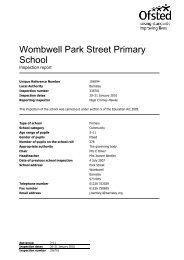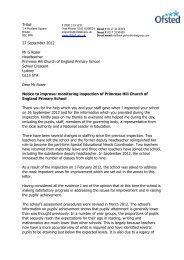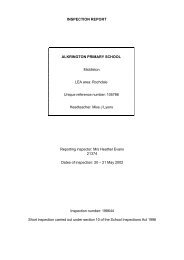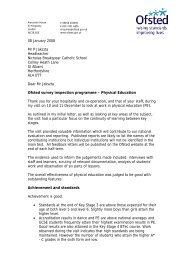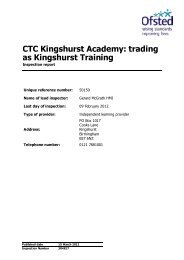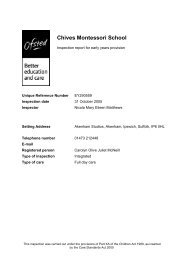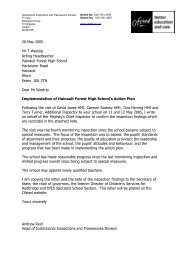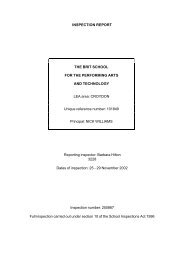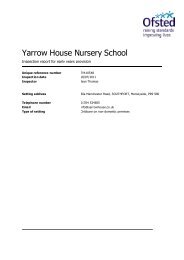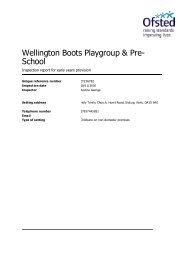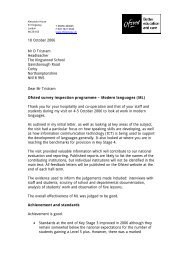pdf College inspection report - Ofsted
pdf College inspection report - Ofsted
pdf College inspection report - Ofsted
Create successful ePaper yourself
Turn your PDF publications into a flip-book with our unique Google optimized e-Paper software.
Gateshead <strong>College</strong><br />
Inspection <strong>report</strong><br />
Unique reference number: 108458<br />
Name of lead inspector: Josephine Nowacki HMI<br />
Last day of <strong>inspection</strong>: 18 May 2012<br />
Type of provider: General Further Education <strong>College</strong><br />
Address:<br />
Published date June 2012<br />
Inspection Number 388571<br />
Baltic Campus<br />
Quarryfield Road<br />
Gateshead<br />
Tyne and Wear<br />
NE8 3BE<br />
Telephone number: 0191 4900300
Inspection Report: Gateshead <strong>College</strong>, 18 May 2012 2 of 31<br />
Information about the provider<br />
1. Gateshead <strong>College</strong> is a large general further education college. The college’s<br />
main site is a purpose-built campus in the Gateshead Quays. The college also<br />
has a specialist sports academy based at Gateshead International Stadium and<br />
two purpose-built skills academies based on the Team Valley. One of these<br />
hosts automotive, engineering, manufacturing and logistics, and the other is a<br />
specialist construction centre. Within a 15 mile radius of the college there are<br />
seven general further education colleges and four universities. Ten of the 12<br />
local schools and academies have sixth form provision.<br />
2. During 2010/11, the college had 8,060 enrolments. Of the 5,511 learners on<br />
full-time courses, around 2,515 were aged 16 to 18. Adults make up the<br />
significant proportion of part-time learners. In 2010/11, approximately 8% of<br />
the college’s learners came from minority ethnic groups, which is higher than<br />
the local population. Around 46% of learners studied at advanced level in<br />
2010/11, and nearly a quarter studied at intermediate level. Programmes are<br />
offered in all subject areas apart from agriculture, horticulture and animal care.<br />
In 2010/11, there were just over 2,200 apprentices. The college holds a large<br />
contract for National Vocational Qualifications (NVQs) in the workplace (formerly<br />
Train to Gain).<br />
3. Gateshead is ranked as the 43 rd most deprived local authority in England. The<br />
unemployment rate is around 11.1%, which is slightly higher than both the<br />
regional average and the national figure. Moreover, male unemployment in<br />
Gateshead is nearly six percentage points higher than the national rate. The<br />
proportion of people qualified to degree level and above has increased in recent<br />
years to nearly 23%, which is slightly lower than the northeast average and<br />
around eight percentage points lower than the national figure. The proportion<br />
of school pupils at local level achieving five GCSEs at A* to C, including English<br />
and mathematics, is slightly higher than the national average, but the rate<br />
varies widely from school to school, from 40% to 88%.<br />
4. Around 655 school pupils aged 14 to 16 attended courses at the college in<br />
2010/11.<br />
5. The college provides training on behalf of the following providers:<br />
� Employer Partnerships – Regional NAC (manufacturing)<br />
� Start Training (Blackstone) (logistics)<br />
� Flooring Assessments LLP (construction)<br />
� Construction and Plan Assessments Ltd (construction)<br />
� Skills NE (health and social care)<br />
� Teamtrain Ltd (logistics)<br />
� DTNE Partnership (health and social care)<br />
� Group Horizon (construction)
Inspection Report: Gateshead <strong>College</strong>, 18 May 2012 3 of 31<br />
� ID Training Ltd (health)<br />
� Cablecom Ltd (telecoms)<br />
� Systems Training (logistics)<br />
� Premier Training International (sport)<br />
� Winnovation (health and social care)<br />
� Premier Performance Training (logistics)<br />
� Shaw Trust (health and social care)<br />
� Phoenix Training (business administration)<br />
� Teamtrain (logistics)<br />
� Baltic Training (information and communication technology).<br />
Type of provision Number of enrolled learners in<br />
2010/11<br />
Provision for young learners:<br />
14 to 16<br />
Further education (16 to 18)<br />
Foundation learning<br />
Provision for adult learners:<br />
Further education (19+)<br />
Employer provision:<br />
Train to Gain<br />
Apprenticeships<br />
Adult and community learning<br />
655 part-time learners<br />
2,515 full-time learners<br />
937 part-time learners<br />
141 part-time learners<br />
466 full-time learners<br />
2,996 full-time learners<br />
3,878 part-time learners<br />
6,037 learners<br />
2,209 apprentices<br />
115 learners
Inspection Report: Gateshead <strong>College</strong>, 18 May 2012 4 of 31<br />
Summary <strong>report</strong><br />
Grades: 1 is outstanding; 2 is good; 3 is satisfactory; 4 is inadequate<br />
Overall effectiveness of provision Grade 3<br />
Capacity to improve Grade 3<br />
Grade<br />
Outcomes for learners 3<br />
Quality of provision 3<br />
Leadership and management 3<br />
Safeguarding<br />
Equality and diversity<br />
Subject Areas Grade<br />
Health and social care:<br />
college-based learning<br />
work-based learning<br />
Engineering and manufacturing technologies:<br />
college-based learning<br />
work-based learning<br />
Information and communication technology 3<br />
Sport and recreation 2<br />
Overall effectiveness<br />
6. Gateshead <strong>College</strong> has many strengths, but also has some weaknesses.<br />
Excellent and productive partnerships with employers enable the college to<br />
make outstanding provision in work-based learning and to help shape the good<br />
college curriculum. Strong collaboration with other agencies has resulted in the<br />
college attracting many groups, including unemployed young people and adults,<br />
back into education. This is a highly inclusive college where learners from all<br />
backgrounds benefit from the harmonious atmosphere that is all-pervasive.<br />
Inspectors agree with learners that the college provides an extremely safe<br />
environment. Care, guidance and support are good. Arrangements for<br />
supporting learners with complex personal, physical and welfare concerns are<br />
excellent. However, the proportion of learners who stay on their college-based<br />
1<br />
3<br />
3<br />
2<br />
2<br />
2
Inspection Report: Gateshead <strong>College</strong>, 18 May 2012 5 of 31<br />
courses and successully complete their qualifications has declined since the<br />
previous <strong>inspection</strong> and there is too much variation in the quality of provision<br />
across the college. Attendance at lessons is often low and, despite the college’s<br />
attendance policy, goes unchecked in a few areas.<br />
7. The quality of teaching and learning is satisfactory, but this masks wide<br />
variations across the college. New teachers and those who are deemed to be<br />
underperforming receive good support from a team of advanced practitioners.<br />
However, systems to develop and strengthen the practice of teachers who are<br />
judged by the college as satisfactory or better are less effective.<br />
8. Arrangements for quality assurance have not been sufficiently effective to drive<br />
improvement quickly in all areas. Self-assessment makes insufficient use of data<br />
and many of the grades in the self-assessment <strong>report</strong> are not an accurate<br />
appraisal of the college’s performance. However, managers have recognised<br />
weaknesses in retention and have implemented effective strategies to rectify<br />
these.<br />
Main findings<br />
� Overall success rates on college-based courses were around the national<br />
average in 2010/11. However, this disguised a declining trend in success rates<br />
on long courses to an unsatisfactory level in 2010/11. Strategies implemented<br />
at the start of the current year are having a positive impact. <strong>College</strong> data<br />
indicate that more learners than in the previous year are staying on their<br />
courses and successfully completing their qualifications. Outcomes on workbased<br />
learning programmes are outstanding.<br />
� Increasing numbers of learners produce work of a good standard. Most learners<br />
who are retained on their courses enjoy college and many make satisfactory<br />
progress. The college’s strengthened attendance policy is having a positive<br />
impact in several areas. However, low attendance prevails in a few areas and<br />
this is a key factor in inhibiting the progress made by many learners. Learners<br />
on work-based learning programmes make excellent progress and work to a<br />
very high standard.<br />
� Learners feel and are safe. They know how to keep themselves and others safe<br />
and they demonstrate safe working practices. Learners take full advantage of<br />
the many opportunities to become involved in the life of the college and the<br />
wider community. Increasing numbers of learners are playing a greater role in<br />
the way the college is run.<br />
� Teaching and learning are satisfactory. The best lessons are planned well, with<br />
explicit learning aims that are discussed with, and understood by, learners.<br />
Teachers promote independent learning effectively and devise meaningful,<br />
enjoyable and effective activities. Less successful lessons are characterised by<br />
poor planning and insufficient attention to ensuring that activities motivate<br />
learners and meet their differing abilities. Assessment practice is good. On<br />
apprenticeship programmes, teaching, training and learning are good.
Inspection Report: Gateshead <strong>College</strong>, 18 May 2012 6 of 31<br />
� Arrangements to improve the quality of college-based teaching and learning are<br />
insufficiently effective. A highly skilled team of advanced practitioners supports<br />
underperforming teachers effectively and helps them to improve their practice.<br />
However, the college’s current system for the observation of teaching and<br />
learning does not fully evaluate or meet the development needs of teachers<br />
who are deemed satisfactory or better so that they can improve further.<br />
� The college’s approach to developing college-based learners’ literacy and<br />
numeracy skills is not effective. Teachers make insufficient use of the outcomes<br />
of the initial assessment to plan learning activities that help to develop their<br />
skills. On work-based programmes, learners’ literacy and numeracy skills are<br />
developed well.<br />
� Partnerships are outstanding. Employers speak extremely highly of the college’s<br />
flexibility in meeting the training needs of their employees very well and in<br />
developing apprenticeships. Labour market information is used well to provide a<br />
good range of college-based courses that offer clear progression routes in most<br />
subject areas. The college works closely with local regeneration initiatives and is<br />
highly successful in attracting young people not currently in education,<br />
employment or training, and unemployed adults, back into education.<br />
� Support to help learners achieve their goals is good. Learners with complex<br />
needs receive excellent tailored support. Individual and group support for<br />
learners on work-based programmes are highly effective. Recruitment and<br />
induction procedures have been strengthened and this is resulting in more<br />
learners completing their courses. Learners at risk of not achieving are now<br />
identified more promptly and support is put in place swiftly.<br />
� Governors and the principal provide a clear strategic direction based on the<br />
college’s values and a clear understanding of local and national priorities. A<br />
number of new initiatives have been introduced to improve performance and<br />
help the college to achieve its ambitions, but it is only in the current year that<br />
actions to improve success rates on long courses are beginning to have a<br />
measurable impact on retention.<br />
� Arrangements to ensure that learners are safeguarded are outstanding. The<br />
college has a very strong culture of safety, and the well-being of learners is<br />
given a high priority. Arrangements for safeguarding are clear and effective and<br />
all appropriate checks and effective monitoring take place. The college provides<br />
a safe and welcoming environment and promotes health and safety and<br />
safeguarding exceptionally well across its provision.<br />
� Self-assessment and quality improvement arrangements are satisfactory.<br />
However, the pace of improvement is inconsistent and has been slow. A key<br />
reason for this is that self-assessment, at both curriculum and college levels,<br />
does not interrogate data sufficiently well when scrutinising performance,<br />
including the performance of different groups of learners. Lack of rigour in the<br />
moderation of the judgements in the self-assessment <strong>report</strong> has resulted in the<br />
college significantly over-grading most areas of provision.
Inspection Report: Gateshead <strong>College</strong>, 18 May 2012 7 of 31<br />
What does Gateshead <strong>College</strong> need to do to improve further?<br />
� Ensure that college-wide strategies to increase the number of learners who stay<br />
and complete their qualifications are implemented rigorously so that the recent<br />
improvements are sustained and strengthened further. Monitor and keep a<br />
sharp focus on those areas where improvement needs to be more rapid.<br />
� Evaluate fully the current process for developing learners’ literacy and numeracy<br />
skills and use this to inform a more coherent strategy that better equips<br />
learners for future employability. Raise attendance rates in all areas of the<br />
curriculum by ensuring a rigorous implementation of the college’s attendance<br />
policy.<br />
� Review the process to provide support to help improve teachers’ performance,<br />
specifically those graded as satisfactory or better, by the college’s internal<br />
observation scheme. Evaluate fully the impact the support has had on the<br />
quality of teaching and learning.<br />
� Improve the accuracy and rigour of self-assessment at curriculum and wholecollege<br />
levels by taking much greater account of the importance of performance<br />
data. Incorporate thorough analysis of data, including the performance of<br />
different groups of learners, when making judgements. Increase the rigour of<br />
the moderation of self-assessment <strong>report</strong>s at all levels in the college.<br />
Summary of the views of users as confirmed by inspectors<br />
What learners like:<br />
� the safe and welcoming environment<br />
� the support and guidance from staff<br />
� gaining extra qualifications<br />
� regular reviews (apprentices)<br />
� the presentation and ease of using e-portfolios (apprentices)<br />
� the teachers and the teaching<br />
� being treated like adults and treated equally<br />
� the resources, including the on-line books and software.<br />
What learners would like to see improved:<br />
� better opportunities to improve GCSE grades<br />
� better advice about career progression<br />
� more full days in the timetable<br />
� more placements for part-time learners.
Inspection Report: Gateshead <strong>College</strong>, 18 May 2012 8 of 31<br />
Summary of the views of employers as confirmed by inspectors<br />
What employers like:<br />
� the flexible approach the college takes in delivering training over and above the<br />
framework requirements that helps to improve the specific skills of apprentices<br />
� good communication between themselves and college that enables them to<br />
support apprentices fully in achieving framework qualifications<br />
� professional and reliable assessors<br />
� being involved in learners’ progress and development.<br />
What employers would like to see improved:<br />
� no recommendations for improvement were received from employers.
Inspection Report: Gateshead <strong>College</strong>, 18 May 2012 9 of 31<br />
Main <strong>inspection</strong> <strong>report</strong><br />
Capacity to make and sustain improvement Grade 3<br />
9. Since the last <strong>inspection</strong>, there has been a significant decline in success rates<br />
on long courses, but, in the current year, the actions taken to improve the<br />
provision are beginning to demonstrate a positive impact. Leaders and<br />
managers have implemented a number of well-considered initiatives, including<br />
revised arrangements for recruitment and induction, closer monitoring of<br />
learners’ progress and a revised curriculum management structure. The result is<br />
that retention is markedly improved in the current year. The college continues<br />
to expand and develop its curriculum well to meet the needs of more learners in<br />
the community. Work with partners and other agencies continues to be<br />
outstanding. Processes for self-assessment and quality improvement have not<br />
proved effective in maintaining the high standards identified at the previous<br />
<strong>inspection</strong>. Access to data to monitor performance is now good. The use of the<br />
data to evaluate performance has been weak, but is improving. The college has<br />
suitable staff and physical resources to carry through its plans for improvement.<br />
its work-based learning provision is outstanding. Financial health is sound and<br />
the management of accommodation and resources is excellent.<br />
Outcomes for learners Grade 3<br />
10. The overall success rate for college-based courses has improved steadily to<br />
around average levels for similar colleges in 2010/11. The high proportion of<br />
learners on short courses achieve satisfactorily. However, the proportion of<br />
learners who completed their long qualifications has declined over the three<br />
years since the previous <strong>inspection</strong> and is low. A significant number of learners<br />
aged 16 to 18 do not complete their qualifications successfully, particularly on<br />
advanced vocational provision. Success rates for adults improved to a<br />
satisfactory level on foundation courses in 2010/11, but declined, and are low,<br />
at intermediate level. Adult achievement is poor on advanced vocational<br />
courses.<br />
11. Success rates vary significantly across subject areas and courses. Success rates<br />
in eight subject areas improved in 2010/11, but, despite this, rates remain<br />
unsatisfactory in many subjects. In 2010/11, in AS- and A-level subjects, there<br />
was a notable improvement in success rates, although this masks a wide<br />
variation in performance between learners of different ages and across the<br />
range of subjects. For example, learners in science subjects do well, but those<br />
in others, such as history and geography, underachieve. Results in functional<br />
skills are weak for the small cohort of college-based learners taking these<br />
qualifications. The proportion of learners gaining high grades in GCSE English is<br />
well above average levels. In GCSE mathematics, high-grade achievement is<br />
low.
Inspection Report: Gateshead <strong>College</strong>, 18 May 2012 10 of 31<br />
12. The likelihood of current college-based learners being successful is much<br />
higher. The college looked carefully into the reasons why learners were leaving<br />
early and implemented a range of strategies. As a result college data indicate<br />
that retention rates are markedly higher than at a similar point in the previous<br />
year. Already a reasonable proportion of learners have secured accredited<br />
qualifications and the signs are that a good many more learners than in<br />
previous years are about to complete their qualifications successfully. The<br />
current cohort of learners are making progress that is at least in line with that<br />
predicted by their prior attainment. Learners’ practical skills are well developed<br />
in vocational areas and increasing numbers of them produce work of a good<br />
standard.<br />
13. Adults who received additional learning support in 2010/11 performed better<br />
than any other group who did not. However, there is no difference in the<br />
performance of learners aged 16 to 18 in 2010/11 who received additional<br />
learning support and those who did not. The numbers of learners from minority<br />
ethnic groups are too small to enable a reliable analysis of their performance<br />
compared with other groups.<br />
14. Outcomes for work-based learning are outstanding. The overall success rates<br />
and completion within planned timescales across all intermediate and advanced<br />
apprenticeship have been consistently good or better and above national<br />
averages for at least the last four years. The completion within the planned time<br />
for NVQs in the workplace shows a similar trend. There are no significant<br />
variations in the performance of any different cohorts of learners, with all<br />
performing well against comparative national averages.<br />
15. Those learners who stay on their courses enjoy college life. They work well with<br />
their teachers and peers. A high proportion move onto higher-level courses.<br />
Many learners enhance their employability successfully through gaining<br />
additional qualifications valued by employers. However, the development of<br />
learners’ literacy and numeracy skills is weak and the proportion of learners on<br />
college-based courses taking and achieving functional skills is too low.<br />
Apprentices and learners taking NVQs in the workplace develop very good<br />
literacy and numeracy skills. Although punctuality is generally good, attendance<br />
is low on many college-based programmes.<br />
16. Learners feel and are safe in the college and in their working environments.<br />
They use working practices that keep themselves and others safe, especially<br />
when using tools and equipment in workshops. Thorough checks are carried out<br />
on employers’ health and safety and they are supported well to improve to the<br />
standard required. Health and safety training for staff and learners is extensive.<br />
All learners know to whom they should <strong>report</strong> concerns.<br />
17. Health and well-being are promoted effectively across all college sites. The<br />
proportion of learners participating in sexual health events, such as chlamydia<br />
screening, is high. Learners make a good contribution to the college and wider<br />
community through extensive fundraising, drama productions and projects to<br />
promote sustainability in the environment. Increasingly learners are asked to
Inspection Report: Gateshead <strong>College</strong>, 18 May 2012 11 of 31<br />
play a greater role in the way their college is run, and they respond very<br />
enthusiastically to this.<br />
The quality of provision Grade 3<br />
18. The quality of teaching and learning is satisfactory. The best lessons are<br />
planned well, with explicit learning aims that are discussed with, and<br />
understood by, learners. Teachers use a wide range of teaching methods<br />
designed to encourage independent learning and are successful in engaging<br />
learners in meaningful, enjoyable and effective learning activities. Information<br />
and learning technology (ILT) is used well and at appropriate times, to add<br />
value and interest to the learning activities. In contrast, less successful lessons<br />
are characterised by poor planning by the teacher and insufficient attention to<br />
ensure that activities motivate and meet the differing abilities of all learners.<br />
19. Assessment practice for college-based courses is good and learners receive<br />
detailed and helpful feedback to help them improve. Assessment practice in the<br />
workplace is strong. Assessors ensure that assessment arrangements suit the<br />
working patterns of employees. Feedback is thorough and constructive.<br />
20. The college has invested energy and resources to extend teachers’ skills and<br />
knowledge. Highly effective training is given to teachers who are new to the<br />
college. A wide range of on-line training and examples of good practice in<br />
teaching and learning are supported and enhanced by an annual programme of<br />
staff development. Recent and frequently repeated training on promoting<br />
equality and diversity in lessons has yet to impact on developing learners’<br />
understanding in lessons. Arrangements to improve the quality of teaching and<br />
learning are insufficiently effective. A highly skilled team of advanced<br />
practitioners support underperforming teachers effectively to help them<br />
improve. However, the identified development needs of teachers who are<br />
deemed satisfactory or better is managed at curriculum level and no formal<br />
evaluation is collated centrally to identify the impact of support or training and<br />
whether this has led to improvements in teaching. Consequently, the college<br />
does not have an accurate picture of the quality of teaching and learning.<br />
Curriculum performance data are not interrogated alongside the outcomes of<br />
observations and this means that support is often not targeted where it is<br />
needed most. Inspectors’ graded lesson observations did not reflect the<br />
college’s profile of a high proportion of good or better teaching grades.<br />
21. Relationships between teachers and learners are productive and respectful. An<br />
effective induction programme develops and accredits learners’ positive<br />
attitudes, social and study skills, and increasingly helps prepare them well for<br />
studying. The college’s approach to developing learners’ literacy and numeracy<br />
skills is insufficient. Learners’ literacy, numeracy and language skills are<br />
assessed at enrolment. However, the development of these skills within the<br />
curriculum is weak.
Inspection Report: Gateshead <strong>College</strong>, 18 May 2012 12 of 31<br />
22. On apprenticeship programmes, teaching, training and assessment are good.<br />
Levels of learners’ literacy and numeracy skills are assessed at the beginning of<br />
their programme and a good proportion of learners who are already operating<br />
at the key skill level required by the apprenticeship programme take a higher<br />
level key skills qualification. Where learners’ specific literacy or numeracy<br />
development needs are identified, staff are very responsive in providing<br />
effective and timely tuition to help them improve.<br />
23. The curriculum meets the needs and interests of most learners well. Clear<br />
progression routes are available in nearly all areas of provision. A good range of<br />
apprenticeships is available for learners preferring a work-based route. Local<br />
labour market information is used shrewdly by staff to inform future curriculum<br />
plans. Data provided during <strong>inspection</strong> show that progression between levels of<br />
study and into employment is good as is progression to higher education. Many<br />
learners benefit from a very good range of short qualifications that enhance<br />
their skills and expertise effectively. Opportunities for learners to participate in a<br />
wide range of enrichment activities are good across all main college sites. A<br />
particular strength of the college is learners’ participation in the wide range of<br />
successful competitive sports teams.<br />
24. Outstanding partnership working brings significant benefit to learners. The<br />
college’s very strong and collaborative partners include local, regional and<br />
international companies. Their close involvement in developing provision is<br />
instrumental in ensuring that both collegeand work-based courses are tailored<br />
to meet the changing skills’ needs as the region’s industrial base changes. A<br />
particularly impressive feature of the college’s partnership working is the<br />
development of provision to meet the needs of the developing sustainable and<br />
renewable technology and low-carbon industries. The college is recognised for<br />
its success in attracting young people who are currently not in education,<br />
employment or training, and adults, back into education. Links with schools are<br />
good and well established.<br />
25. The care, guidance and support learners receive are good. Learners with<br />
complex physical and/or mental health issues receive excellent tailored support,<br />
often provided through partnerships with other agencies. Staff have further<br />
developed their excellent skills to respond to changes in learners’ needs, for<br />
example, recruiting a mental health specialist and receiving training in selfharm.<br />
One-to-one and group support for learners on work-based programmes<br />
are highly individualised and include the provision of signers for hearingimpaired<br />
learners. On college-based programmes, learning support assistants<br />
help learners effectively within the classroom in a few areas, including<br />
engineering and sport and recreation, but they are not effectively deployed in<br />
others. Laptops are issued to learners to help them study at home. Good use is<br />
made of financial support to help learners who would otherwise leave their<br />
programme.<br />
26. As part of its strategy to improve retention, the college has strengthened<br />
information, advice and guidance to ensure that learners are on the right<br />
programme. Revised induction procedures help learners settle quickly onto their
Inspection Report: Gateshead <strong>College</strong>, 18 May 2012 13 of 31<br />
programmes. Learners at risk of not completing their programme are now<br />
identified and monitored closely. Recently appointed retention coordinators<br />
provide a range of interventions to help learners continue with their<br />
programmes. Systems are in place to monitor and respond to absence, but<br />
attendance is still low in a few remaining areas.<br />
Leadership and management Grade 3<br />
27. The principal and governors provide clear strategic leadership and direction.<br />
Planning is based on a clear and up-to-date focus on national and local priorities<br />
which are widely understood by staff. The revised management structure is<br />
designed to strengthen performance management and staff accountability.<br />
While there are signs of improvement, it is too early to measure its full impact.<br />
Following a significant decline over several years, particularly in success rates<br />
on long courses, it is only in the current year that the interventions to improve<br />
performance can be seen to be having a positive impact. Leadership and<br />
management of work-based learning are outstanding. High aspirations have led<br />
to very effective and consistently successful provision.<br />
28. Governors understand the challenges faced by the college in its economic and<br />
social environment and focus clearly on the needs of employers and the local<br />
community. They possess a good range of experience and expertise which they<br />
use well to monitor the performance of the college. They have challenged<br />
college managers to improve retention and success rates where they are low.<br />
Committee work is thorough. Student governors are supported and encouraged<br />
to give their views. Governors carry out their statutory duties in respect of<br />
safeguarding, health and safety, and equality and diversity.<br />
29. The college’s promotion of safeguarding is outstanding. Policies and procedures<br />
are very comprehensive, clearly understood and are followed closely by staff.<br />
Thorough checks are made on the suitability of employed staff, volunteers,<br />
governors and subcontractors to work with young people and vulnerable adults.<br />
Highly effective individual support plans are developed for learners with<br />
safeguarding needs to ensure their safety and the safety of other learners. The<br />
college has very effective health and safety policies and procedures based on<br />
risk assessments that are updated regularly. Governors receive regular <strong>report</strong>s<br />
about safeguarding, accidents and near misses. Very thorough action is taken to<br />
address near misses. Excellent training is provided, for example, through<br />
simulation events involving police and public service learners responding to a<br />
simulated terrorist attack in the college. Staff are well qualified. All sites have<br />
CCTV and this is monitored centrally. Where safeguarding issues have arisen,<br />
the college has taken swift action and involved other appropriate agencies.<br />
30. The college is an inclusive community based on expressed values of tolerance<br />
and respect. The college deals swiftly and appropriately with any complaints by<br />
learners about bullying and harassment and reinforces its code of student<br />
conduct regularly. It has recently developed a ‘fitness to study’ procedure to<br />
ensure that, where there are concerns regarding mental health or well-being,<br />
learners are supported sensitively and appropriately. It is working with
Inspection Report: Gateshead <strong>College</strong>, 18 May 2012 14 of 31<br />
Stonewall to ensure that the college is safe and supportive for lesbian, gay and<br />
bisexual staff and learners. The college’s involvement in a wide range of<br />
initiatives draws in many who might not otherwise participate in education and<br />
training. The recently established Gateshead <strong>College</strong> Foundation charity<br />
supports a diverse range of learners to attend the college. The college has<br />
taken successful actions to widen participation, but it does not use data<br />
sufficiently to identify differences in performance between groups or to measure<br />
the impact of actions taken. Equality and diversity are promoted inconsistently<br />
at curriculum level.<br />
31. The college is good at gathering and responding to learners’ views. Learners<br />
have a number of opportunities to give their views through surveys, course<br />
representatives and informally with their teachers and tutors. Student<br />
representation is strong on the governing body, but meetings of the learners’<br />
parliament are poorly attended and course representation is not consistent<br />
across the college. The college has recently appointed a sabbatical president to<br />
reinvigorate and strengthen the learner voice. The college is also working to<br />
enable learners with disabilities to express their views more forcefully through a<br />
‘Your Voice Counts’ event. Learners are highly satisfied with their experiences in<br />
the college and feel that their views are listened to and responded to<br />
effectively. The views of employers and partners are used effectively to develop<br />
and improve provision. This is a real strength in the college’s work-based<br />
learning provision, involving employers closely in all aspects of their work,<br />
including in the design of the curriculum.<br />
32. Arrangements for quality assurance are satisfactory. Self-assessment and<br />
improvement planning processes are comprehensive, but, until recently, they<br />
have not been effective in securing improvements at a fast enough pace.<br />
Neither the course self-assessment <strong>report</strong>s nor the curriculum area <strong>report</strong>s have<br />
provided a sufficiently rigorous analysis of learners’ outcomes. They have not<br />
recognised the significance of, or given sufficient weight to, success rate trends<br />
or benchmarking data in their judgements and grading. The whole college selfassessment<br />
<strong>report</strong>, consequently, is inaccurate and provides an over-optimistic<br />
view of performance. However, quality improvement plans have shown<br />
awareness of where improvements are needed, and, for example, A levels have<br />
improved. The work-based learning self-assessment <strong>report</strong> is an example of<br />
good practice, analysing data very effectively to inform detailed target setting.<br />
Good developments in the way that management information is provided are<br />
helping to sharpen the monitoring of performance this year. Retention and<br />
achievement are both showing signs of marked improvement compared with a<br />
similar point in the previous year.<br />
33. Strong financial performance has enabled the college to invest in<br />
accommodation and resources, many of which are of industry standard and<br />
which help to provide an excellent environment for learners. The college is<br />
paying attention to sustainable development in its building plans and makes use<br />
of wind and solar energy where it can. Given the outstanding work-based<br />
learning provision, the high quality facilities and resources for learning and the
Inspection Report: Gateshead <strong>College</strong>, 18 May 2012 15 of 31<br />
significant improvements in retention and associated achievements in the<br />
current year, the college now provides good value for money.
Inspection Report: Gateshead <strong>College</strong>, 18 May 2012 16 of 31<br />
Subject areas<br />
Health and social care: college-based learning Grade 3<br />
Context<br />
34. Full and part-time courses are offered in health and social care. Courses are<br />
available from foundation through to advanced level and to foundation degree.<br />
Currently just over 200 learners aged 16 to 18 and 220 adults study on full-time<br />
courses. Around 311 learners aged 16 to 18 and 620 adults take part-time<br />
courses.<br />
Key findings<br />
� Outcomes for learners are satisfactory. Success rates on advanced-level courses<br />
have been consistently high, but dipped to below average in 2010/11. Success<br />
rates are satisfactory at intermediate level. Success rates on the access to<br />
higher education programme remain high. Current learners are making<br />
satisfactory progress to achieve their intended learning goals and more are<br />
staying to complete their courses than previously. Attendance is low.<br />
� Learners’ written work is of a satisfactory standard. Assessment is planned well<br />
and learners receive prompt and appropriate feedback. Learners have good<br />
access to work experience and placements in a variety of health and care<br />
settings. A significant number of learners have been able to secure paid<br />
employment in care settings as a result of their placement experience and<br />
development of their practical skills.<br />
� Teaching and learning are satisfactory. In the best lessons, learners are<br />
stretched through a variety of stimulating activities. For example, in a<br />
foundation-level lesson, learners were given ‘the power’ to nominate each other<br />
when recapping learning; this enabled all learners to participate and build<br />
confidence in their knowledge and understanding. In other sessions, teachers<br />
use a narrow range of activities and learners are left to work unproductively for<br />
too long.<br />
� Resources to support teaching and learning are satisfactory. Classrooms are<br />
comfortable and well equipped, with interactive whiteboards which many, but<br />
not all, teachers use to good effect. In the better lessons, both staff and<br />
learners use ILT effectively, but this is not always the case.<br />
� Links between theory and practice are not always made well. Many teachers<br />
encourage learners to reflect upon the learning experiences gained during their<br />
practical work placements to illustrate successful activities, issues and care<br />
dilemmas. However, this practice is not widespread; sometimes this is because<br />
a small number of teachers are not vocational specialists.<br />
� The range of provision is satisfactory. Courses in health and social care are<br />
available from foundation through to foundation degree. Many learners progress<br />
through all the levels. Adult learners are able to study the access to higher
Inspection Report: Gateshead <strong>College</strong>, 18 May 2012 17 of 31<br />
education course to enable them to achieve career aspirations and improve<br />
their chances of securing work. Full-time learners currently have a satisfactory<br />
choice of additional qualifications to help broaden and develop their skills.<br />
Opportunities for learners to develop their literacy and numeracy skills are<br />
insufficient.<br />
� Partnerships with schools, employers and community groups are satisfactory.<br />
Links are in place to ensure availability of good practical work placements.<br />
However, the department is aware that more needs to be done to involve the<br />
industry in the design, planning and delivery of the curriculum.<br />
� Pastoral support for learners is good. Staff use the college’s electronic data<br />
system to monitor learners’ progress and agree and set realistic targets.<br />
Learners at risk are now identified more promptly and course tutors work with<br />
support staff to rectify issues that get in the way of learning. Learners speak<br />
highly of the support they receive. Bursaries and bus passes are available for<br />
learners in need of financial support and from September 2011 learners have<br />
been issued with laptops to assist with their studies.<br />
� Self-assessment lacks rigour and is insufficiently self-critical. There has been<br />
slow implementation of strategies to improve retention, although this is<br />
improving in the current year. However, issues in the timetable structure, for<br />
example, long gaps between classes, inhibit the amount of progress a few<br />
learners make and have an overall negative impact on learners’ experiences.<br />
What does Gateshead <strong>College</strong> need to do to improve further?<br />
� Maintain the focus on the need to improve success rates, particularly through<br />
increasing retention. Raise attendance through a consistent expectation by all<br />
staff that all learners must attend lessons.<br />
� Increase the proportion of good and better teaching and learning by ensuring<br />
that class activities provide sufficient challenge and stretch learners. Develop<br />
teachers’ skills to enable them to use ILT more effectively to enhance and make<br />
learning interesting.<br />
� Improve the rigour of self-assessment. Make sure that areas for improvement<br />
are identified clearly and action plans are monitored routinely.<br />
� Review the organisation of the curriculum to ensure that timetables support<br />
effective teaching and learning. Provide learners with access to vocationally<br />
experienced practitioners who can provide more opportunities for learners to<br />
link theoretical learning with current practice.
Inspection Report: Gateshead <strong>College</strong>, 18 May 2012 18 of 31<br />
Health and social care: work-based learning<br />
Context<br />
35. At the time of the <strong>inspection</strong>, 213 learners were taking NVQs in the workplace<br />
at intermediate or advanced levels in health and social care. An apprenticeship<br />
programme was introduced at the start of 2010/11. Currently, around 100<br />
learners are following apprenticeships at intermediate or advanced levels.<br />
Around three quarters of learners across work-based programmes are female.<br />
Key findings<br />
Grade 2<br />
� Outcomes for work-based learners are good. Overall success rates in 2010/11<br />
are high. Completion rates within the planned time declined to a satisfactory<br />
level in the previous two years, but are much improved and above the national<br />
average in 2010/11. Success rates for the first cohort of intermediate<br />
apprentices are good. Most current learners make at least good progress on<br />
their programmes.<br />
� All learners are highly motivated and enjoy their learning. Learners understand<br />
clearly what they need to do to progress and how to improve. They develop<br />
effective skills and increase their understanding of how to raise the standards of<br />
care for the people they look after. Learners display good commitment and<br />
attitude to their learning, developing very good personal skills and gaining<br />
increased confidence.<br />
� Learners value highly the opportunity to take additional qualifications. Learning<br />
about dementia care for one learner has ensured that she is more responsible<br />
and can provide high standards of care for her client. Learners and employers<br />
also value the additional medication programme offered through a distancelearning<br />
programme. All learners feel safe, secure and appreciate the support<br />
they are given by both assessors and employers.<br />
� Assessment practice and monitoring of learners’ progress are good and result in<br />
high rates of completion within planned timescales. Staff are highly skilled,<br />
experienced professionals who are able to contextualise learning and tease out<br />
further understanding by providing relevant scenarios, such as, ‘tell me what’<br />
and ‘how would you respond to’ scenarios. Overall, good coaching is used to<br />
develop learners’ skills of independent thinking.<br />
� The needs and interests of both learners and employers are met effectively.<br />
Learners are given a choice of units that match their interest and skill<br />
development. The relationships with employers are outstanding. Assessors<br />
make their expectations of employers clear and this enables employers to<br />
support learners fully in their learning. Employers state, and inspectors agree,<br />
that the college takes the time to understand fully the needs of their employees<br />
and responds to these very well.<br />
� The care, guidance and support learners receive are outstanding. Learners feel<br />
highly supported while on programme. For example, they know who to contact<br />
if there are any issues or questions and have a range of ways in which to do
Inspection Report: Gateshead <strong>College</strong>, 18 May 2012 19 of 31<br />
this, such as by email and text messaging. This in turn keeps them on track and<br />
motivated to achieve. Learners are assessed at times that are both convenient<br />
to them and to their employers, and this includes evenings.<br />
� Staff are managed and coordinated particularly well. Managers have high<br />
expectations and the staff respond very positively. For example, staff state that<br />
they feel re-energised and are, ‘being pushed out of their comfort zone’. Staff<br />
state that they feel fully supported by managers and team leaders. The team is<br />
clear about their role in enhancing learning; meeting the needs of the clients<br />
and learners is the main priority.<br />
� Arrangements for safeguarding are very strong and meet the very high<br />
expectations of the sector. A strategic decision to recruit only assessors with<br />
considerable management experience in health and social care ensures a high<br />
prioritisation of safeguarding for learners. Safeguarding is a key component of<br />
staff induction and learner review and assessment.<br />
� The promotion of equality and diversity is strong. A culture of mutual respect<br />
and understanding is clearly evident in both staff and learners’ attitudes and<br />
behaviour. Staff training in equality and diversity is an integral part of monthly<br />
team meetings, with additional training to meet specific aspects such as<br />
dyslexia and dementia. Learners show a high level of understanding of equality<br />
and diversity and can readily use examples from their workplaces during<br />
discussions with assessors. Data analysis of different groups is not yet fully<br />
established.<br />
� Quality assurance is good and very effective in leading to improvements. All<br />
aspects of the learners’ experience and every programme are evaluated<br />
rigorously. The paperwork, however, is overly focused on the role of the<br />
assessor rather than the impact on the learner. Performance of learners and<br />
staff is monitored closely.<br />
What does Gateshead <strong>College</strong> need to do to improve further?<br />
� Ensure that all aspects of quality assurance focus closely on how the area’s<br />
work impacts on the learner. When evaluating performance, incorporate a<br />
detailed data analysis of the outcomes of different groups of learners and use<br />
this to inform actions for improvement.
Inspection Report: Gateshead <strong>College</strong>, 18 May 2012 20 of 31<br />
Engineering and manufacturing technologies:<br />
college-based learning<br />
Context<br />
36. Courses are offered in automotive body repair and paint, motor vehicle<br />
maintenance and repair, and engineering craft and technician work. Many of<br />
these courses are available from entry through to advanced and degree levels.<br />
At the time of the <strong>inspection</strong>, 294 full-time and 1,145 part-time learners were<br />
taking college-based programmes. Few learners are female. A low proportion of<br />
learners come from minority-ethnic groups.<br />
Key findings<br />
Grade 2<br />
� Outcomes for learners are good. Success rates on long courses have been<br />
above the national average in 2009/10 and 2010/11. For learners aged 16 to<br />
18, the success rate has been satisfactory and, for adults, it has been high. The<br />
success rate at intermediate level is consistently high. Across individual courses,<br />
the success rates are variable. Retention in the current year is much improved<br />
and more consistent across all programmes.<br />
� Learners develop their practical skills effectively and maintain high standards.<br />
They work efficiently in the workshops and make good progress. They work<br />
safely and receive good support from the teachers, who are vocationally<br />
competent and experienced. In an advanced lesson in vehicle body repair, for<br />
example, learners worked diligently, showing good facility with tools and<br />
equipment, and produced work of high quality.<br />
� Teaching and learning are good, especially in practical lessons. In workshops,<br />
learners benefit from excellent resources and spacious accommodation to<br />
support the curriculum. These are used well to provide learners with a good<br />
range of workshop activities. In a few areas, such as mechanical principles,<br />
resources are underdeveloped.<br />
� The quality of theory teaching is more variable. There is good use of ILT in a<br />
few lessons, where weblinks are used well to show appropriate video clips of<br />
engineering operations and learning is reinforced by probing questioning.<br />
Practical activity within theory lessons is also used to good effect and learning<br />
and wider skills are reinforced by requiring learners to make presentations of<br />
their work.<br />
� A few theory lessons also displayed weaknesses such as the slow pace of<br />
learning, underdeveloped assessment of learning, too much use of electronic<br />
presentations and ineffectively managed group work. Much of the theory or<br />
practical work does not develop literacy, research and <strong>report</strong> writing sufficiently<br />
well.<br />
� Assessment is managed well. Assignments are spread through the year and<br />
deadlines are clear to learners. Assignment briefs are clear, as are grading
Inspection Report: Gateshead <strong>College</strong>, 18 May 2012 21 of 31<br />
criteria. Marked work is returned promptly, but teachers’ annotation of it is not<br />
always helpful enough to enable learners to improve.<br />
� The monitoring of learners’ progress has improved this year. It is now very<br />
effective. Revised college data systems enable teachers and managers to<br />
monitor the progress of learners closely, identify those at risk and put in place<br />
relevant support where needed.<br />
� Progress reviews with individual learners are held appropriately frequently.<br />
Tutors benefit from a new college system that collates <strong>report</strong>s from each<br />
teacher. The short-term learning targets set by teachers are not always useful<br />
enough to help learners improve.<br />
� The range of provision offers good opportunities for progression from entry<br />
level to advanced level and beyond. There are particularly strong links with<br />
Nissan and the curriculum area is very responsive to their requirements. This<br />
relationship has a very positive impact on the quality of resources and the<br />
expertise of teachers.<br />
� Learners receive good individual support. They speak positively about the<br />
informal support provided by teachers both inside and outside formal lessons.<br />
They also benefit from good support from learning support assistants who<br />
provide individual support within lessons and whenever else they require it.<br />
� Curriculum management is good. Realistic targets are set and used to improve<br />
performance. Management information is accurate and readily available.<br />
Equality and diversity are promoted satisfactorily, but the approach to how this<br />
is done in the teaching is not systematic enough. Female learners and staff are<br />
used well to promote recruitment of female learners, but this has yet to have<br />
more impact. Learners’ views are collected in appropriate ways and these views<br />
inform improvement.<br />
� The quality of provision is <strong>report</strong>ed on in self-assessment <strong>report</strong>s at course, and<br />
curriculum area, levels. These are detailed and contain much analysis and<br />
comment. However, they do not evaluate key aspects of provision such as the<br />
quality of teaching and learning sufficiently rigorously and contain an overly<br />
positive view of the quality of outcomes. The implementation of quality<br />
improvement plans at curriculum area level is not monitored rigorously enough.<br />
What does Gateshead <strong>College</strong> need to do to improve further?<br />
� Develop the quality of the teaching of theory by providing focused support on<br />
the management of group work and assessment for learning and enhance the<br />
quality and range of equipment to support the teaching of mechanical<br />
principles.<br />
� Improve the usefulness of the short-term learning targets set to inform<br />
progress reviews by providing training and discussion about best practice<br />
among teachers and tutors.<br />
� Adopt a more consistent approach to the development of literacy, research and<br />
<strong>report</strong>-writing skills, and the promotion of equality and diversity, by ensuring
Inspection Report: Gateshead <strong>College</strong>, 18 May 2012 22 of 31<br />
that schemes of work identify which lessons lend themselves readily to these<br />
requirements and then ensure that these lessons provide them.<br />
� Increase the rigour of self-assessment by analysing learners’ outcomes and the<br />
quality of teaching and learning more thoroughly and ensure the more<br />
systematic monitoring of quality improvement plans.
Inspection Report: Gateshead <strong>College</strong>, 18 May 2012 23 of 31<br />
Engineering and manufacturing technologies:<br />
work-based learning<br />
Context<br />
37. The college offers engineering apprenticeships at intermediate and advanced<br />
levels for 676 learners, of which just under 2% are female and around 2% are<br />
of minority ethnic heritage. Currently around 622 learners follow NVQs at<br />
intermediate level in the workplace.<br />
Key findings<br />
Grade 2<br />
� Outcomes are good. In 2010/11, the overall success rate for apprentices was<br />
high and very high for advanced apprentices. Completion within the planned<br />
timescale for all apprentices was consistently high. The success rate for NVQs in<br />
the workplace is just above the average level. Completion within the planned<br />
time has improved and is now good.<br />
� Apprentices’ attendance at both college and the workplace is good and learners<br />
make good progress in completing their qualifications. Progress reviews are<br />
regular and, on most occasions, employers are present when the review takes<br />
place. Previous targets are reviewed fully and realistic short-term targets are<br />
set. Progression from level 2 to level 3 apprenticeships is very high.<br />
� Development of learners’ skills is good. Skills displayed by learners in the<br />
workplace, operating heavy lifting equipment, rectifying faults in vehicle body<br />
pressing dies and servicing emergency response vehicles, demonstrate that<br />
learners are working responsibly, independently and to industry standards.<br />
Learners have good opportunities to acquire skills and knowledge, exceeding<br />
the requirements of their main qualification, through a range of short courses.<br />
� Learners feel safe both in college and the workplace. They demonstrate an<br />
outstanding knowledge of health and safety in the workplace. Safeguarding<br />
information is given priority during induction and is reinforced in reviews. Good<br />
security arrangements are in place at all the college sites and workplaces visited<br />
during the <strong>inspection</strong>.<br />
� Individual coaching and promotion of learning are good. Teaching is good and<br />
attendance is high at most sessions. Learners’ needs are identified clearly and<br />
effectively supported by assessors during progress reviews. Learners’ files<br />
contain a good range of reference materials related to their occupational areas<br />
which they put to good use in practical sessions.<br />
� The range of provision is outstanding and meets the needs of learners and<br />
employers. The college has strong links with employers who are complimentary<br />
about the support given to their apprentices. Employers are offered a good<br />
range of qualification pathways to meet their needs.<br />
� Partnership working is outstanding. The college works collaboratively with<br />
partners to deliver programmes at, for example, Nissan UK. The impact of the
Inspection Report: Gateshead <strong>College</strong>, 18 May 2012 24 of 31<br />
partnership is that learners have access to an excellent range of resources<br />
which enable them to develop high-level occupational skills. The promotion of<br />
the importance of professional body membership is not yet embedded fully in<br />
learners’ programmes.<br />
� Care, guidance and support for learners are good. Monitoring of learners’<br />
progress is close and frequent and often conducted with the involvement of the<br />
employer. Feedback on college-based assessments gives learners clear<br />
guidance on how to improve their grades. Underperformance issues with<br />
learners are dealt with robustly and helpfully by college tutors.<br />
� Leadership and management are good. Systems for self-assessment are<br />
thorough. Quality improvement plans identify accurately where appropriate<br />
actions are required, although staff are not always clear about their role in the<br />
implementation of these. Resources for engineering learners are very good in<br />
the workplace and college sites visited during the <strong>inspection</strong>.<br />
� The promotion of equality and diversity is covered fully in learner review<br />
sessions. Most learners demonstrate a sound understanding of matters relating<br />
to equality and diversity. Apprentices, workplace colleagues and employers are<br />
respectful of each other.<br />
What does Gateshead <strong>College</strong> need to do to improve further?<br />
� Ensure that all staff have a clear understanding of their role in the<br />
implementation of quality improvement action plans.
Inspection Report: Gateshead <strong>College</strong>, 18 May 2012 25 of 31<br />
Information and communication technology<br />
Context<br />
38. Full-and part-time courses are offered from entry to advanced level for<br />
practioners and users. Of the 618 learners, just over a half are aged 16 to 18.<br />
Approximately 41% of all learners study part-time. Around one quarter of<br />
learners are female.<br />
Key findings<br />
Grade 3<br />
� Outcomes for learners are satisfactory. This masks a wide variation in<br />
performance across programmes and ages. Success rates on several<br />
intermediate courses including the certificate in IT User Skills are high, as are<br />
rates on AS- and A-level information and communication technology (ICT)<br />
courses. Success rates on a few other programmes have declined and are low.<br />
Performance in the foundation award in IT User Skills declined in 2010/11 and<br />
is very low.<br />
� Learners aged 16 to 18 perform at a satisfactory level. Adults’ performance in<br />
2010/11 was low. Many courses now being offered are new and therefore it is<br />
difficult to identify any trends. However, of the courses that have run for two<br />
years or more, approximately 64% of the provision performs above national<br />
benchmarks.<br />
� A small number of learners have already completed their studies within the<br />
current academic year and college data indicate that more learners are staying<br />
to complete their qualifications than at a similar point in the previous year.<br />
Attendance in classes observed was low. The department is aware of general<br />
attendance issues and is taking action to improve this.<br />
� Learners develop good employability skills by using specialist software and<br />
hardware. The college’s specialist software is freely and legally available to<br />
learners, to encourage them to continue their studies at home or elsewhere.<br />
Course projects are devised with ‘real work’ scenarios, to better prepare<br />
learners for commercial standards and to equip them with work-ready skills.<br />
Learners’ academic targets are set and monitored routinely. However, other<br />
targets, such as career aims and personal skills are not recorded or monitored<br />
effectively in electronic individual learner plans.<br />
� Learners feel safe. Learners are aware how to be safe when using ICT<br />
equipment. They keep drinks away from computers, maintain good posture<br />
throughout lessons and are confident that they are able to raise concerns with<br />
staff. Learners value the awareness-raising sessions about eBullying, ‘sexting’<br />
and identity fraud.<br />
� Teaching and learning are satisfactory. The best lessons are well structured and<br />
most move at a quick pace. Learners develop their IT skills well and many make<br />
at least satisfactory progress within lessons. Staff are experienced and
Inspection Report: Gateshead <strong>College</strong>, 18 May 2012 26 of 31<br />
demonstrate good awareness of developments within ICT. Current news,<br />
software and technological knowledge are shared frequently with learners.<br />
� In the less successful lessons, a lack of planning to meet the needs of the moreable<br />
learners results in them not being fully challenged. All classrooms contain<br />
fit-for-purpose computers, software and hardware for the benefit of the<br />
learners. Interactive whiteboards are installed in each classroom, but these are<br />
not used to good effect in all lessons.<br />
� There is a good range of provision, from entry level through to advanced level,<br />
with clear progression routes to higher levels. Partners and employers are<br />
involved routinely in curriculum design and changes to the programme, and<br />
provide very useful training and updating for staff. Employers are highly<br />
committed to the work of the department and offer work experience in return<br />
for the college’s high level of response to meeting their training needs.<br />
� The promotion of equality and diversity is satisfactory. All learners demonstrate<br />
skills of effective teamwork and show respect to other learners and staff.<br />
Equality and diversity topics are promoted satisfactorily within the curriculum<br />
and group tutorials when the opportunity arises. However, data are not<br />
analysed systematically to identify the performance of different groups in order<br />
to take appropriate action to close achievement gaps.<br />
� Curriculum management is satisfactory. Staff are involved in self-assessment<br />
and understand its value. However, the <strong>report</strong> does not identify sufficiently<br />
accurately the weaknesses in the area. For example, it does not give enough<br />
weight to the areas for improvement in teaching and learning. The use of data<br />
to analyse performance is insufficient. Many of the grades awarded in the<br />
subject area self-assessment <strong>report</strong> were generous.<br />
What does Gateshead <strong>College</strong> need to do to improve further?<br />
� Analyse carefully the reasons why learners leave their courses early and<br />
implement actions to rectify this in order to halt the decline in success rates on<br />
a few courses, particularly the award in IT User Skills. Ensure that all staff set<br />
high expectations that learners must attend all lessons and implement<br />
rigorously the college’s attendance policy.<br />
� Identify the characteristics of the best lessons and share this with all staff in<br />
order to improve the consistency of teaching and learning in the department.<br />
� Be more rigorous in evaluating performance in the area. Analyse data<br />
thoroughly, including the outcomes of different groups of learners and use this<br />
to identify accurately where performance is strong and where it needs to<br />
improve in order to inform action planning.
Inspection Report: Gateshead <strong>College</strong>, 18 May 2012 27 of 31<br />
Sport and recreation<br />
Context<br />
39. Full-time academic and vocational courses are offered from intermediate to<br />
advanced level. Nearly all of the current 388 learners study at advanced level.<br />
The college offers a significant number of short courses in sports coaching,<br />
health and fitness and sports officiating.<br />
Key findings<br />
Grade 2<br />
� Outcomes for learners are satisfactory. Success rates on AS- and A-level<br />
courses are high. Success rates on vocational courses at intermediate and<br />
advanced levels have been below national averages for three years. Although<br />
too many learners leave before completing their courses, a significant<br />
proportion of those who complete achieve high grades. Retention rates have<br />
improved markedly in the current year. Significant numbers of learners are<br />
making at least good progress towards the achievement of their qualification.<br />
On short courses, success rates are consistently high.<br />
� Learners develop very high levels of practical skills, knowledge and<br />
understanding that they apply both to participation in sport and as sports<br />
coaches. Many learners gain professional contracts, for example, to play rugby,<br />
football, cricket and basketball, and a high proportion of learners progress to<br />
university. Learners improve their group management skills, self-esteem,<br />
communication and personal organisational skills.<br />
� Learners feel safe. Risk assessments carried out by staff and learners are<br />
rigorous and very well enforced. Good emphasis is placed upon ensuring safe<br />
practice and reducing the risk of injury when playing sport. Learners make a<br />
very important contribution to the community by helping to organise local<br />
sporting events and participating in sports teams.<br />
� Lessons and coaching sessions are planned well. Good links are made between<br />
theory work and practical application in identifying the components of fitness<br />
training programmes and implementing them in individualised programmes.<br />
Learners are generally well engaged in lessons and tutors make good and<br />
regular checks of knowledge and understanding. More demanding tasks<br />
maintain motivation and interest and learners develop their skills at a good<br />
pace. Learning support assistants are used well to support learners with their<br />
literacy and numeracy skills.<br />
� Resources to support learning are outstanding. Sports facilities are modern and<br />
built to national standards, and classrooms are spacious. This, and the access to<br />
high quality coaches, impact very positively on learners’ motivation, with many<br />
learners achieving outstanding levels of success in competitions. Good use is<br />
made of ILT and learners benefit from the provision of laptops which are loaned<br />
by the college.
Inspection Report: Gateshead <strong>College</strong>, 18 May 2012 28 of 31<br />
� Tutors and peers give learners constructive and timely feedback on their<br />
practical and theory assignments. Learners’ progress is now reviewed more<br />
frequently through individual tutorials that identify what they have achieved and<br />
what still needs to be completed. Learners at risk of not achieving are identified<br />
quickly and effective additional support is provided to keep them on their<br />
programme.<br />
� The range of provision is satisfactory. Long-course provision is offered mainly at<br />
advanced level. There are a few courses at intermediate level, but no provision<br />
at foundation level. However, there is a strong emphasis on equipping learners<br />
with several industry-specific qualifications and these enhance significantly their<br />
employment prospects.<br />
� Excellent links with a range of partners, including schools, the local authority,<br />
professional sports clubs, employers, national governing bodies of sport, the<br />
English Institute for Sport and a range of community groups enhance the<br />
experience of learners and contribute to the excellent strategic approach to<br />
sports development in the local community.<br />
� Induction, initial assessment and reviews of learners’ progress have improved<br />
and are now effective, ensuring that learners’ specific support needs are<br />
identified and met promptly. Good individual support helps learners with course<br />
or personal difficulties to remain on the programme. Learners benefit from<br />
access to physiotherapy, sports science, nutrition and psychology support.<br />
� Management of the sport and recreation programmes has improved and now<br />
places more emphasis on the need to improve retention on long courses. Staff<br />
are well managed and supported. Good training and development opportunities<br />
further enhance the competence of staff. Communications are very effective,<br />
both internally and with external partners, to ensure that the provision is well<br />
coordinated.<br />
� Processes to gather and use learners’ and stakeholders’ feedback are well<br />
established and have influenced the curriculum review, timetabling of activities<br />
and the strategies to meet the needs of learners who require specific support.<br />
The self-assessment process has given insufficient weight to the impact of<br />
course performance data in evaluating the overall quality of provision.<br />
What does Gateshead <strong>College</strong> need to do to improve further?<br />
� Improve the rigour of self-assessment. Ensure that course performance data<br />
are analysed thoroughly to help inform where the department needs to<br />
improve. Ensure sufficient weight is given to learners’ outcomes when<br />
evaluating performance.<br />
� Maintain the close monitoring of learners’ progress and analyse fully why<br />
learners do not stay and complete their qualifications. Use this to inform actions<br />
and strategies that improve retention still further.<br />
� Review the existing curriculum to meet the needs of foundation- and<br />
intermediate-level learners more effectively.
Inspection Report: Gateshead <strong>College</strong>, 18 May 2012 29 of 31<br />
Information about the <strong>inspection</strong><br />
40. Four of Her Majesty’s Inspectors (HMI) and seven additional inspectors, assisted<br />
by the provider’s vice principal, as nominee, carried out the <strong>inspection</strong>.<br />
Inspectors also took account of the college’s most recent self-assessment <strong>report</strong><br />
and development plans, comments from the funding bodies, the previous<br />
<strong>inspection</strong> <strong>report</strong> and data on learners and their achievement over the period<br />
since the previous <strong>inspection</strong>.<br />
41. Inspectors used group and individual interviews, telephone calls and emails to<br />
gain the views of learners and employers. They also looked at questionnaires<br />
learners and employers had recently completed for the provider. They observed<br />
learning sessions, assessments and progress reviews. Inspectors collected<br />
evidence from programmes in each of the subject areas the college offers.
Inspection Report: Gateshead <strong>College</strong>, 18 May 2012 30 of 31<br />
Record of Main Findings (RMF)<br />
Gateshead <strong>College</strong><br />
Learning types: 14 – 16: Young apprenticeships; Diplomas; 16-18 Learner responsive: FE full- and part-time courses,<br />
Foundation learning tier, including Entry to Employment; 19+ responsive: FE full- and part-time courses; Employer<br />
responsive: Train to Gain, apprenticeships<br />
Grades using the 4 point scale<br />
1: Outstanding; 2: Good;<br />
3: Satisfactory; 4: Inadequate<br />
Approximate number of enrolled learners<br />
Full-time learners<br />
Part-time learners<br />
Outcomes for learners 3 3 3 1<br />
How well do learners achieve and enjoy their learning? 3<br />
� How well do learners attain their learning goals?<br />
� How well do learners progress?<br />
How well do learners improve their economic and social well-being through<br />
learning and development?<br />
How safe do learners feel? 2<br />
Are learners able to make informed choices about their own health and<br />
well being?*<br />
2<br />
How well do learners make a positive contribution to the community?* 2<br />
Quality of provision 3 3 3 1<br />
How effectively do teaching, training and assessment support learning and<br />
development?<br />
How effectively does the provision meet the needs and interests of users? 2<br />
How well partnerships with schools, employers, community groups and<br />
others lead to benefits for learners?<br />
How effective are the care, guidance and support learners receive in<br />
helping them to achieve?<br />
Leadership and management 3 3 3 1<br />
How effectively do leaders and managers raise expectations and promote<br />
ambition throughout the organisation?<br />
How effectively do governors and supervisory bodies provide leadership,<br />
direction and challenge?*<br />
How effectively does the provider promote the safeguarding of learners? 1<br />
How effectively does the provider actively promote equality and diversity,<br />
tackle discrimination and narrow the achievement gap?<br />
How effectively does the provider engage with users to support and<br />
promote improvement?<br />
How effectively does self-assessment improve the quality of the provision<br />
and outcomes for learners?<br />
How efficiently and effectively does the provider use its available resources<br />
to secure value for money?<br />
Overall<br />
6301<br />
11708<br />
3<br />
3<br />
2<br />
3<br />
1<br />
2<br />
3<br />
2<br />
3<br />
2<br />
3<br />
2<br />
16-18<br />
Learner<br />
responsive<br />
19+<br />
Learner<br />
responsive<br />
Overall effectiveness 3 3 3 1<br />
Capacity to improve 3<br />
2961<br />
1269<br />
3340<br />
5023<br />
Employer<br />
responsive<br />
2270<br />
2681
Inspection Report: Gateshead <strong>College</strong>, 18 May 2012 31 of 31<br />
The Office for Standards in Education, Children’s Services and Skills (<strong>Ofsted</strong>) regulates and inspects to<br />
achieve excellence in the care of children and young people, and in education and skills for learners of<br />
all ages. It regulates and inspects childcare and children’s social care, and inspects the Children and<br />
Family Court Advisory Support Service (Cafcass), schools, colleges, initial teacher training, work-based<br />
learning and skills training, adult and community learning, and education and training in prisons and<br />
other secure establishments. It assesses council children’s services, and inspects services for looked<br />
after children, safeguarding and child protection.<br />
If you would like a copy of this document in a different format, such as large print or Braille, please<br />
telephone 0300 123 1231 or email enquiries@ofsted.gov.uk.<br />
You may copy all or parts of this document for non-commercial educational purposes, as long as you<br />
give details of the source and date of publication and do not alter the information in any way.<br />
To receive regular email alerts about new publications, including survey <strong>report</strong>s and school <strong>inspection</strong><br />
<strong>report</strong>s, please visit our website and go to ‘Subscribe’.<br />
<strong>Ofsted</strong><br />
Piccadilly Gate<br />
Store Street<br />
Manchester<br />
M1 2WD<br />
T: 0300 123 1231<br />
Textphone: 0161 618 8524<br />
E: enquiries@ofsted.gov.uk<br />
W: www.ofsted.gov.uk<br />
© Crown copyright 2012


